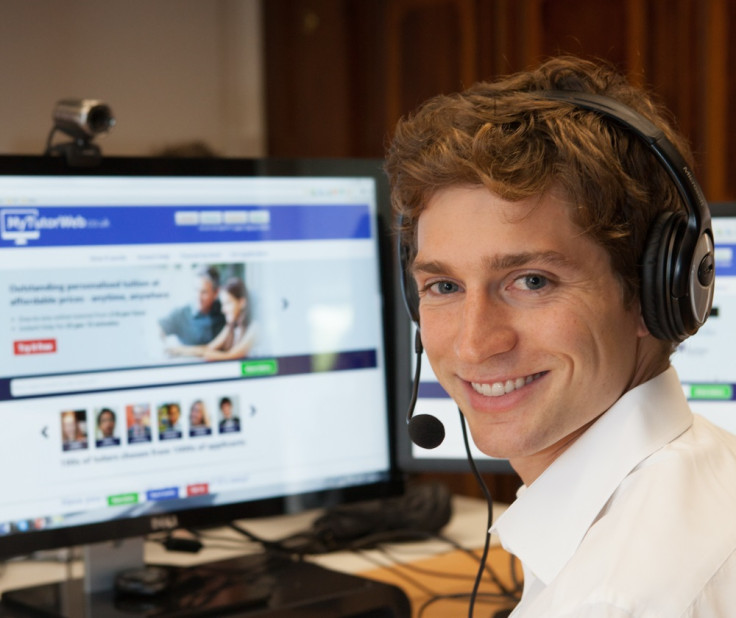Exam results: More students turn to online tutors for A-level and GCSE help

Turning your sprog into a boffin is getting cheaper. And like most things getting cheaper, it is because of the internet: welcome to online tutoring. As Britain's exam-weary children collect their results for GCSEs, AS and A-levels, many of those who do well will have had a good excuse for spending time in front of a computer screen for hours every week. They have been learning in virtual classrooms.
As well as being cheaper than in-home tutoring, it offers a far greater choice of available tutors, covering all niche subjects across its borderless marketplace. The logistics are simpler because tutors do not have to travel to students and vice versa, meaning people can be available immediately via video chat with all the tools they need, such as an interactive whiteboard.
And the technology means students can replay their lessons for revision. What's more, parents can check in to see what happened for quality or security reasons.
If there's a successful maths teacher in the village, that person is a god -- they decide who and when to teach
Bertie Hubbard, founder of the MyTutorWeb online tutoring platform and marketplace, told IBTimes UK that the traditional tutoring model has its benefits. "There is something in the personal interaction," he said, "but you would much rather have a good tutor online than a substandard tutor in your home.
"Finding somebody near you is really hard. You're competing for availability. If there's a successful maths teacher in the village, that person is a god – they decide who and when to teach. And the tutorials are a hassle to arrange when you have to drive somewhere. Parents are spending £400 a week just ferrying people around. It's tough when you have to spend that much and travel.
"So the key advantage is the access – if there's a good tutor, you can access from anywhere, without having to drive to them. It's the choice. You can find somebody who offers a niche subject like classical Greek in minutes. Even if it is mainstream like maths or English, you still need someone who is bright but who you can also identify with and relate to. That choice gives you the flexibility to find somebody who matches up with your child."
Like other digital services, such as Spotify or Netflix, Hubbard's site offers a "try it for free" introductory option so parents, students and tutors can make sure everyone is happy before money exchanges hands for the full-blown service. Moreover, this is not just being used by a privately educated elite – 80% of MyTutorWeb's clients are state school pupils.

Online tutoring's rapid growth
Still small – it only accounts for 1% of the overall tutoring market – the growth of online tutoring is rapid. One online tutoring website, TutorHub, claims to be seeing annual growth in business of 500%. "This is an early stage market. The tutoring industry has been traditionally face to face," says John Ellis, founder of TutorHub and chairman of the online tutoring panel at industry group The Tutors' Association.
"People estimate that there is something like 1.5 million tutors in the UK. But we're probably only seeing a few thousand of those providing online tutoring. So it's useful to recognise that, while it is growing very, very quickly, it is early stage growth.
"What's happening over time is that more and more people are becoming aware of learning on line and they're opening up to e-learning. Online tutoring is one example of it. And people now are much more happy using Skype for communications and expecting good quality video, and that's basically what is changing the market. Because two or three years ago the market was extremely small. I see no reason why over time it shouldn't be worth 30% of the total tutoring market."
I see no reason why over time it shouldn't be worth 30% of the total tutoring market
The Tutors' Association has a code of practice for online tutoring companies. Most demand to see evidence of background checks such as CRB or DBS, or carry out their own.
Despite online tutoring bringing down costs, the price is still an insurmountable barrier for some parents. Fortunately for them and their children, some tutors offer a free alternative: YouTube lessons. While not the same level of interaction as a personal one-on-one session, it still gives students access to additional learning resources for free so they can revise and hone in their own time. Some tutors will even answer questions -- all for nothing.
Colin Hegarty is a maths advanced skills teacher who runs HegartyMaths. He regularly uploads instructional maths videos for the likes of GCSE and A-level students. "Thank you for getting me an A in GCSE maths, couldn't have done it without your videos," says one of the many laudatory YouTube comments on Hegarty's page – which has over 36,000 subscribers and 4.6 million views.
As technology advances, so will the online tutoring experience. With the advent of hardware such as Google Glass and Oculus Virtual Reality, which offer an immersive interactive experience, Hubbard relishes the future for tutoring. He said: "The online interaction is getting richer and richer."
© Copyright IBTimes 2025. All rights reserved.




















